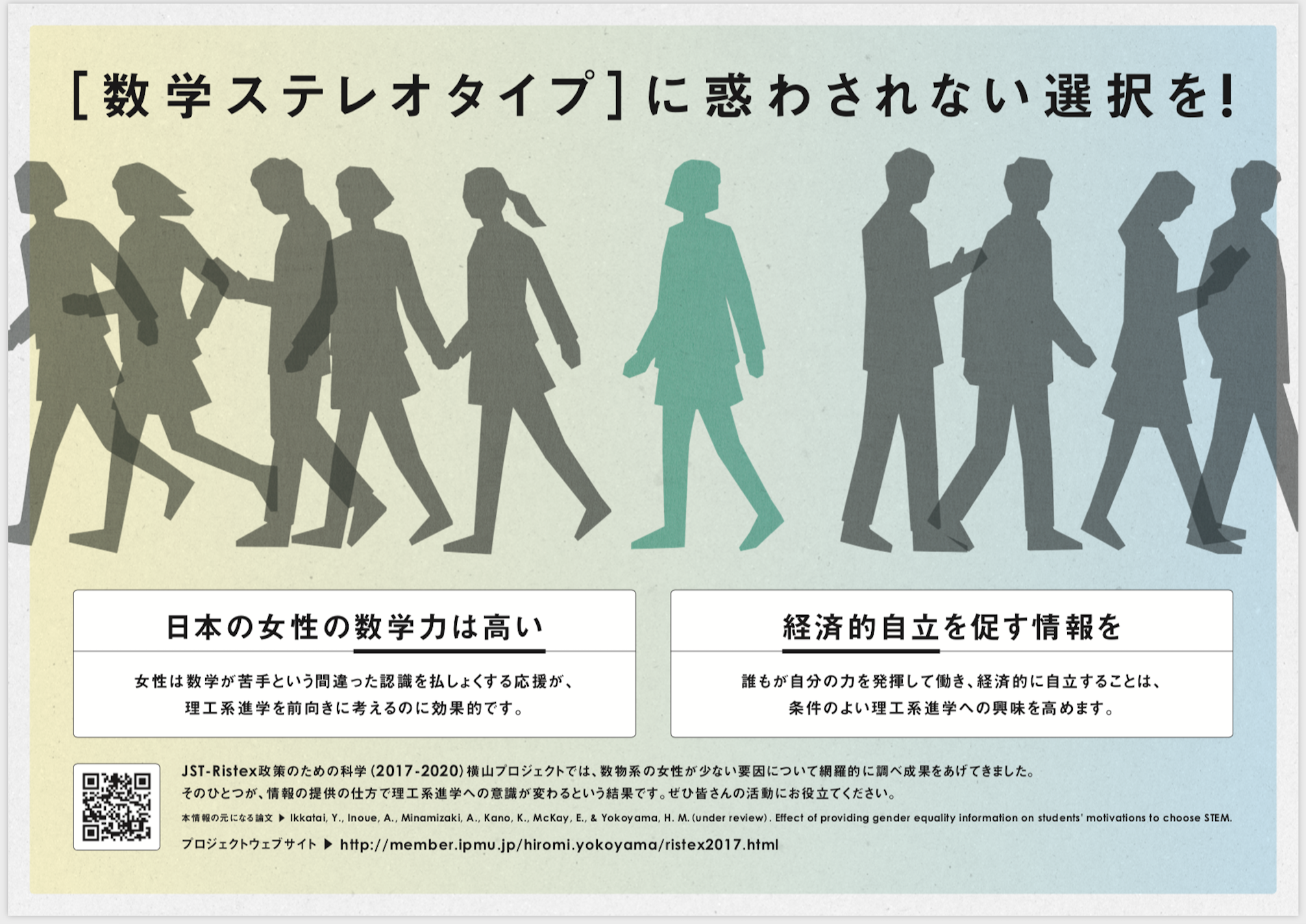Disclaimer: machine translated by DeepL which may contain errors.
What is the cause of the masculine image of mathematics and physics?
Hiromi Yokoyama (Professor, Kavli Institute for the Physics and Mathematics of the Universe)

In Faculty of Science, the Departments of Physics, Mathematics, and Information Science have a particularly low number of women. Why is this? When I was appointed to the Kavli Institute for the Physics and Mathematics of the Universe (commonly known as Kavli IPMU) at The University of Tokyo Institutes for Advanced Study in 2017, Dr. Hitoshi Murayama, then Director of the Institute, asked me to conduct research on this topic. Although I was hesitant to suddenly embark on a completely different field of research, based on Mr. Murayama's enthusiasm, the social significance of the project, and my specialty in Social Theory of Science and Technology (STS), I thought of conducting research focusing on social factors that are different from those in the field of education. There are six members, half male and half female, from psychology, educational economics, science education, and other fields.
We have summarized the results in nine papers to date, and found that mathematics and physics have a strong male image compared to other fields. What factors, then, reinforce the masculine image of these fields? We focused on review papers in the field of educational psychology (Cheryan 2017). Based on nearly 100 papers, we grouped the reasons why there are fewer women in physics, computer science, and engineering than in biology and mathematics in the U.S. into three groups: 1) masculine culture, 2) childhood experiences, and 3) low self-efficacy. (Note that in the U.S., math is categorized as the more female group.)
We developed a completely different study based on this with two originalities: First, we added (4) social climate to (1) to (3), taking into account that Japan is a low gender gap index country (120th in 2021/out of 156 countries). Second, data were obtained from about 1,000 students at a time in Japan and England and analyzed to see which factor had the greatest effect on the image of men in physics and mathematics, not all of the items (1) to (4) at the same time.
The results showed that the item in (1) had the strongest effect on the male image of mathematics and physics. In addition to the male image of employment, it was the false stereotype that mathematics is male-dominated and the idea that excellence is a male thing. Similar to this, the newly added item (4) revealed that those who do not prefer excellent women have a masculine image of mathematics. The effects of various types of exclusion embedded in Japanese society were clearly shown statistically (Ikkatai et al. 2021a).
Based on the above results, we asked male and female first-year junior high school students what kind of information would make them more positive about entering a science course. In addition to information on employment, we provided them with information on equality and information on the removal of mathematical stereotypes, and not only female students but also male students showed a positive attitude toward entering the sciences (Ikkatai et al. 2021b). We would be happy if you could use these results in your activities.
In the FoPM (Forefront Physics and Mathematics Program for World-leading and Smart Innovation), MEXT's Doctoral Program for World-leading and Smart Innovation (WISE Program), which started in FY2019, we conducted a seminar on diversity and ethics with Dr. Murayama, which was very well received by the students. There are aspects in which Japanese male students, as Asians, are in a minority in the world. We are thinking together about what we can do to contribute to the creation of a better environment. In addition, Kavli IPMU has started an activity called the Diversity Initiative under the leadership of Director Hiroshi Ohguri. The goal is to improve access to academics for all by breaking down invisible barriers, thereby advancing academics. There are reports that students who study mathematics overseas have better earnings in the future. However, we must not forget that the starting point is to maintain "equality of opportunity" in academia.
Ikkatai, Y et al. , Public understanding of science 30, 810 2021a
Ikkatai, Y et al . , PLOS ONE 16 6 , e0252710 2021b
Published in Faculty of Science News January 2022



